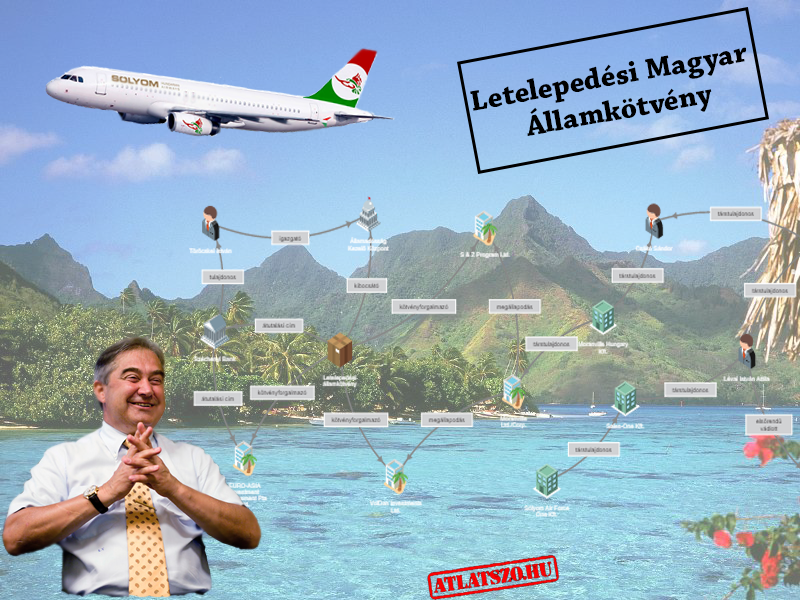The https://english.atlatszo.hu use cookies to track and profile customers such as action tags and pixel tracking on our website to assist our marketing. On our website we use technical, analytical, marketing and preference cookies. These are necessary for our site to work properly and to give us inforamation about how our site is used. See Cookies Policy
Banker connected to controversial government bond schemes
A well-known oligarch, whose official job together with his business interests mean a clear conflict of interest, was found to be connected to another government initiative – the controversial bonds that give de facto citizenship in return for money, no questions asked. Unsurprisingly, being distributor of these bonds isn’t bad business at all.
István Töröcskei is currently head of Hungary’s state debt management agency AKK, the office responsible for the sale of government bonds and securing the market funding needed to keep the country running. He is also the co-owner of the Széchenyi Bank, a commercial finance firm, the other half of which is owned by the state.

While the paperwork can be made to look as if it fits the letter of the law, for example even though Töröcskei passed up executive duties in the bank he co-owns so he could become a public servant, his dual roles were already grounds for claiming conflict of interest.
The Széchenyi Bank itself is also controversial in other ways. This was the bank that submitted a symbolic 1 forint bid for the Hungarian arm of Austria’s Raiffeisen Bank, which was reeling from debt and was therefore vulnerable. The deal would have involved Széchenyi taking over Raiffeisen’s debts and, since the Töröcskei bank was short of capital, the costs were to be paid by the state. In short, the government was ready to buy another bank for Töröcskei.
The deal fell through. Raiffeisen didn’t accept the terms and is still on the market, but Széchenyi wasn’t out of the headlines for long. Information obtained by the hvg.hu news portal pointed to a regulatory audit that found extreme cases of mismanagement, irresponsible financial matters and information indicating that the bank had made commitments that it couldn’t realistically meet, thinking that the Raiffeisen takeover was in the bag and the state would step in with the necessary money.
Ataltszo.hu discovered that the Széchenyi Bank, nonetheless, remains on the good side of the government, as it became involved with the lucrative elements of the so-called settlement bonds.
The government tool to secure financing this way is troubling in itself. For 250,000 euros (a figure that could soon be raised to 300,000) and a commitment to hold the paper for five years, foreign nationals are cleared to legally settle in Hungary and get free access to the European Union. Critics of the bond have lashed out against the tool saying it is a form of institutionalized money laundering, since those taking advantage are essentially buying citizenship with hardly any oversight about where their wealth may have come from.
It is hardly a surprise that the sale of these bonds is conducted by an obscure network of curious participants. A Singaporean distributor, for whatever reason, picked Széchenyi Bank as its Hungarian partner to manage the accounts receiving the funds paid for the bonds, as evidenced by its website. Yet other distributors in other parts of the world can be linked to firms in Belize and other offshore havens, all tied to one-another in intricate networks, some of which we discovered don’t even have proper licenses to distribute the bonds.
This tangled web led to a general who was dishonorably discharged from the military in a high profile court case. He was a former figurehead of the company group that was planned to be built around Solyom, the airline which had hoped to step into the gap left by the collapse of Hungary’s national airline. The story proved to be a farce.
Atlatszo.hu asked the sides involved to comment on whether they think this arrangement is legitimate. AKK said that parliament’s economy committee is in charge of selecting the companies which receive authorization to distribute the bonds abroad, AKK has no say in the matter and the companies are free to choose their Hungarian banking partners. Széchenyi said that it is managing the accounts used for the settlement bonds, but other than that, it is providing no services directly to the AKK. The bank also reiterated that Töröcskei no longer holds any executive duties, and as such there is nothing to worth investigating.

